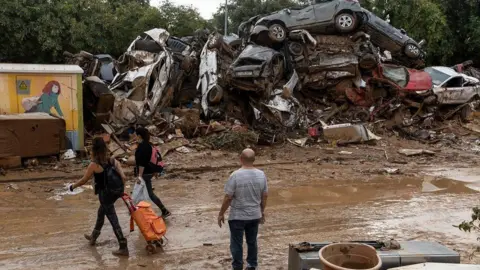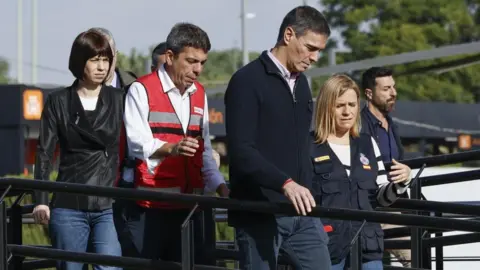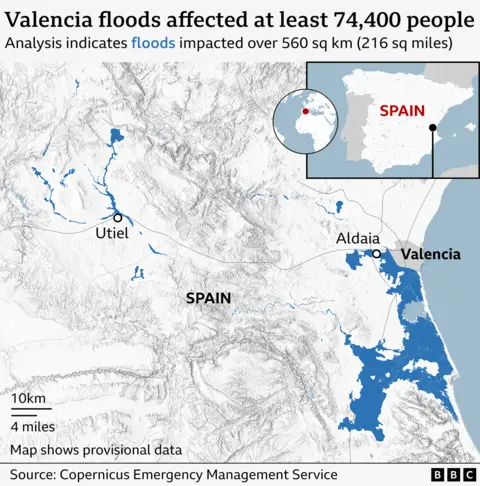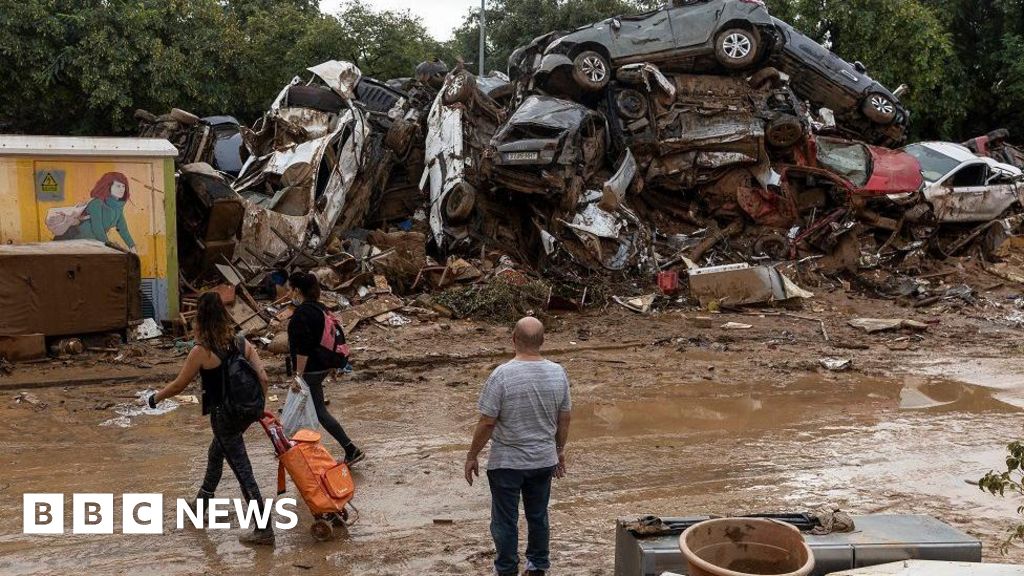 Getty Images
Getty ImagesA week after flash floods ripped through eastern Spain, amid scenes of anger from affected people, there are accusations of blame for the country’s worst natural disaster in living memory.
Initial images of nonpartisan unity have been replaced by disputes over which agency has jurisdiction over the disaster area, where at least 218 people have lost their lives.
Immediately after the floods, Carlos Massón, leader of the Valencia region of the Conservative People’s Party (PP), welcomed Prime Minister Pedro Sánchez of the Socialist Party and thanked him for the government’s support.
Prime Minister Masson even called Sánchez “dear Prime Minister,” an unusual sight given Spain’s deeply polarized politics.
The leader of the Valencia region has come under criticism for taking around 12 hours to respond to the red weather warning issued by Spain’s National Meteorological Agency (Aemet) on October 29 and to issue the warning directly to people’s mobile phones. However, by then the floods had already caused extensive damage.
However, PP national leader Alberto Nuñez Feijó questioned the information provided by Aemet, which is supervised by the central government. He also complained that the prime minister’s government was not coordinating with local governments.
Since then, pressure has mounted on Mazon, with many critics and political opponents calling for his resignation, citing his actions that day and his decision to eliminate the Valencia Emergency Unit (UVE) when he took office last year.
In response, he, like his party leaders, took a more confrontational approach.
This includes blaming the Madrid-run CHJ hydrographic agency for allegedly setting off the alarm on the day in question and later canceling it.
“If CHJ had reissued the hydrological alert, the warning message would have been sent immediately,” Mazon said.
In response, the CHJ explained that while it provides data on rainfall and related matters, it does not issue any warnings of this type.
Currently, 15,000 troops, private security personnel and police have arrived in the Valencia region, double the number from last weekend.
 EPA
EPAMazon refuted claims that the government did not request sufficient assistance from the military in response to the weather event, insisting that the military itself was responsible for such decisions.
Javier Marcos, head of the Military Emergency Unit (UME), responded that the protocol stipulates that local governments must request such assistance.
“We can have 1,000 members at the entrance to the emergency, but legally they cannot enter without permission from the person in charge of the emergency,” he said of Valencia’s leaders.
Mazon’s comments about the military reportedly infuriated Defense Minister Margarita Robles, who expressed her anger during an emergency meeting of King Felipe and his cabinet on Monday.
Meanwhile, the political situation has become more complicated after Prime Minister Nuñez Feijoo called on the prime minister to declare a national state of emergency. This will centralize crisis management in Madrid and take power away from Valencia’s regional government.
Santiago Abascal, leader of the far-right Vox party, also supports such measures, which the government denies.
“Mr. Sánchez is responsible for not using all national resources that could have saved lives,” he said, accusing the government of “wickedness and incompetence.”
The king, Mr. Sánchez and Mr. Masson all spoke on Sunday about public anger over the response to the tragedy, with people in Paiporta, the Valencian town hardest hit by the floods, throwing mud and calling them “them.” faced a counterattack. Murderers.”
As the scene became increasingly violent, the Prime Minister’s security personnel escorted him to his car. Mazon stayed close to the King and Queen Letizia, and both tried to interact with some of the locals and reassure them that everything possible was being done to help.
Although the wisdom of that visit has been widely questioned, Mr Mazon has since presented a €31.4 billion proposal to rebuild flood-hit areas, to be funded by the central government.
Meanwhile, Prime Minister Sánchez separately announced an initial support package worth 10.6 billion euros.
“What the Spaniards want is for their organizations to work side by side and not to fight each other,” he said at the time of the announcement.





